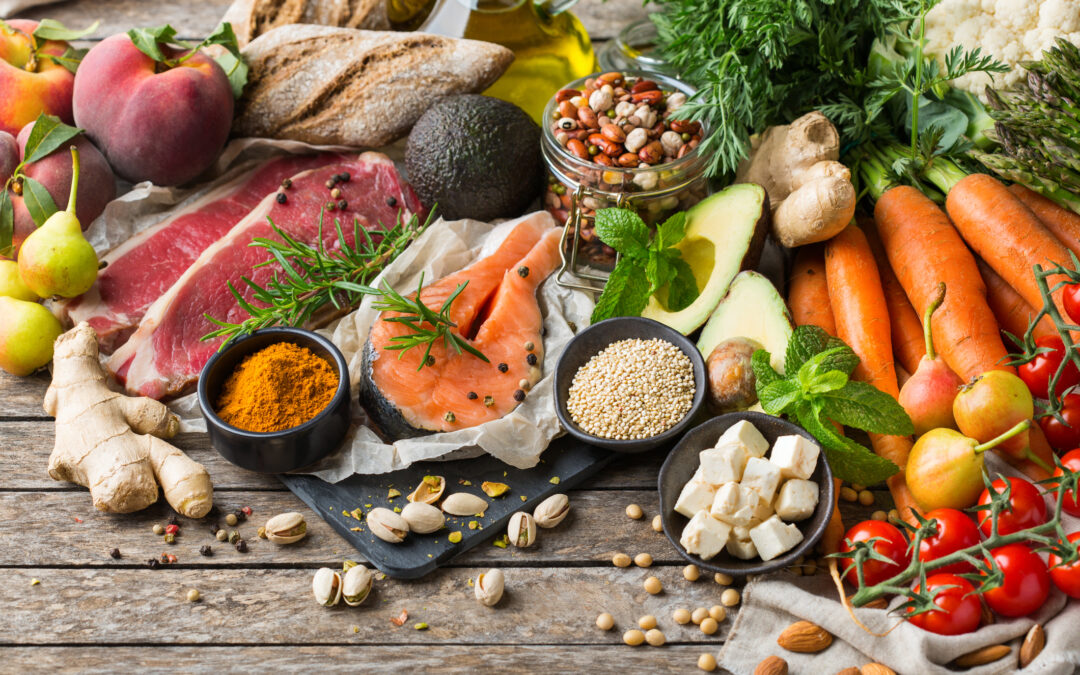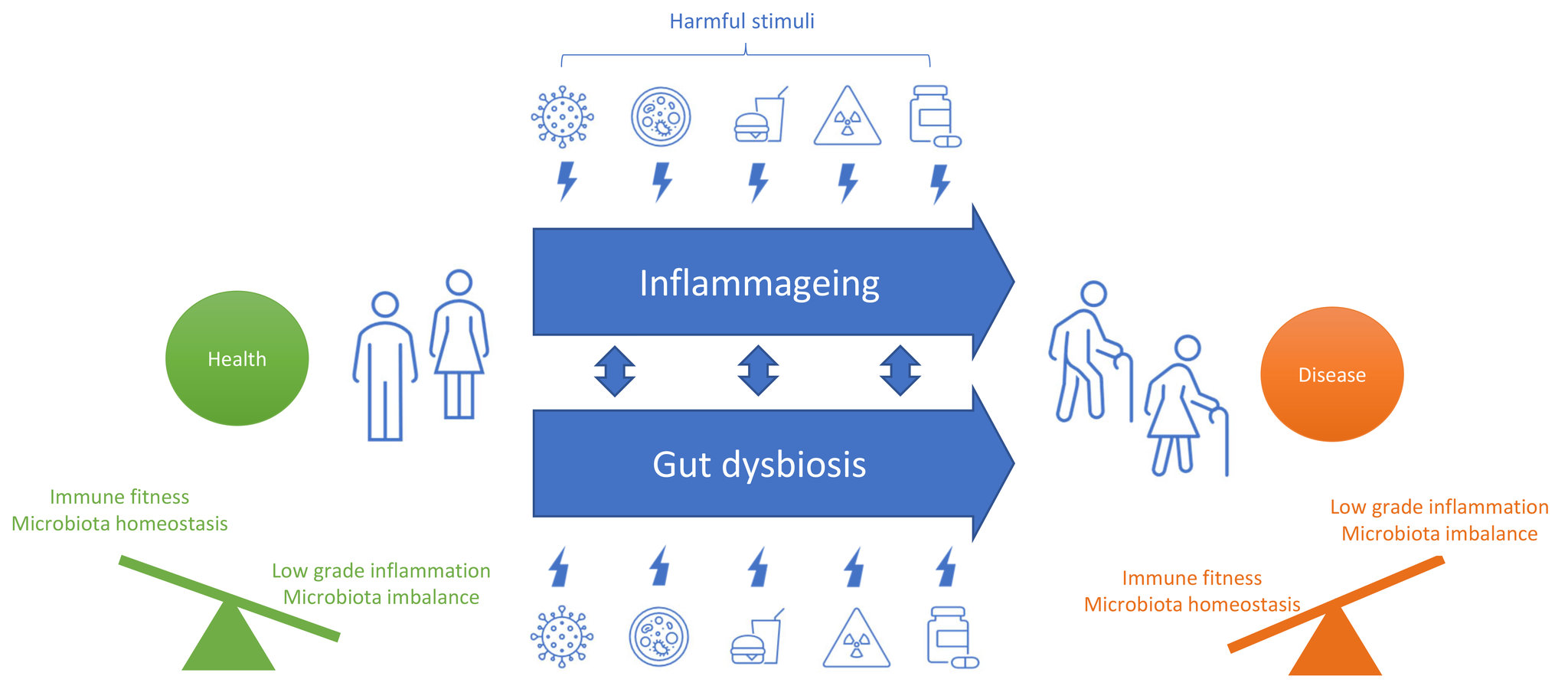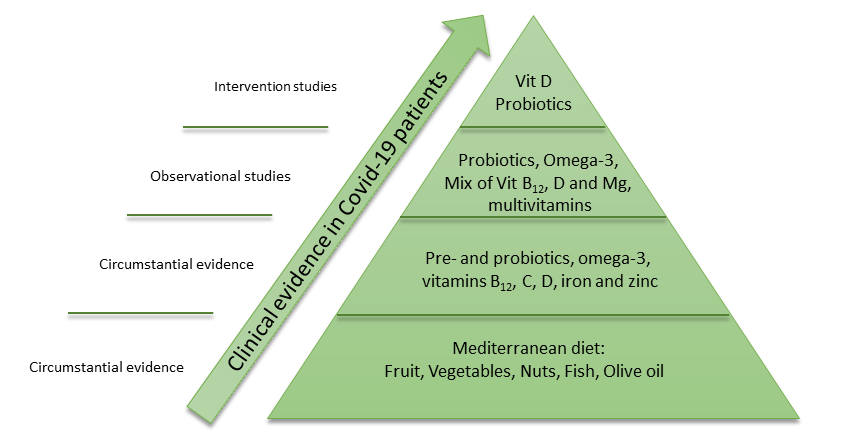Introduction
Since the start of the pandemic in December 2019, coronavirus SARS-Cov2 has killed 6.4 million people and infected at least 570 million people worldwide while the numbers are still continually increasing1. The population most vulnerable are seniors, especially those who are obese and/or have an underlying disease like diabetics or cardiovascular disease.
Why are they so susceptible to COVID-19 and what do they have in common? This as yet isn’t completely clear. However, it seems seniors with/without the abovementioned disease suffer from an ongoing low grade inflammatory process (called inflammaging) and a gut microbiota disbalance, which unravels potential targets for prevention or treatment.
Therefore, the main objective of this paper is to explore seniors’ increased vulnerability to COVID-19 in terms of the function of their aged immune system (inflammaging) and their gut microbiota imbalance, and to suggest a few ways to intervene in order to lower the risk of coronavirus infection in seniors with or without underlying disease.
The latest science suggests that interventions with probiotics, omega-3, vitamin D and multivitamins, that target these mechanisms, might be successful.
Ageing population
The world is rapidly ageing. One in five people worldwide will be over 60+ in 2050. Although we all live longer nowadays, unfortunately the quality of life as we age hasn’t improved in recent years. The prevalence of diseases like heart disease, arthritis and osteoporosis are still very high in senior people which drastically impacts their mobility and quality of life. Also the susceptibility to infection increases with age. Therefore, developing and promoting adequate nutrition for the senior people is extremely important in order to help them maintain health for as long as possible.
Ageing population and susceptibility to infection
Seniors represent the group most vulnerable to COVID-19, with underlying age-related health issues, such as hypertension, diabetes and cardiovascular disease, being risk factors that can lead to complications in the case of infection. Further, the inevitable natural deterioration of the immune system makes it harder for older adults to fight off infection. Obesity, smoking and malnutrition also weaken the immune system and are thus associated with increased risk. Generally, there are nutritional deficiencies in for instance calcium, vitamin D, folate, and zinc among the senior population. A poor nutritional status is widely considered one of the significant risk factors for severe COVID-192. According to a study in Wuhan, where the outbreak started, the prevalence of malnutrition is elevated in seniors with COVID-193.
Ageing and inflammageing
During ageing, chronic, low-grade inflammation — called inflammageing — develops, which contributes to the pathogenesis of age-related diseases. It is associated with a decline in the effectiveness of the immune system termed immunosenescence. A variety of stimuli sustain inflammageing, including viruses, pathogenic bacteria, a poor diet, psychological stress, pollutants, damaged cells or specific drugs (Figure 1). Across the lifespan, people have to constantly adapt to these harmful stimuli. The balance between pro- and anti-inflammatory parameters may shift to a more pro-inflammatory state, and, consequently, age-related diseases may emerge and ability to responds effectively to viruses and other pathogenic organisms decreases. In some COVID-19 cases the immune system even overreacts, which is known as the cytokine storm, damaging the cells more than the virus it targets.
Figure 1. The ageing process: a lifelong adaptive response to harmful stimuli leading to inflammageing and gut dysbiosis.
Ageing and a microbiota disbalance
The gut is a key contributor to our immunity, with more than 80% of the immune cells residing in the gut. The functioning of the immune system is closely linked to the functioning of the gut microbiota and vice versa. With age, the microbiota becomes less diverse and disbalanced. Many factors influence the microbiota including viruses, diet, pathogenic bacteria and antibiotics (Figure 1).
In seniors, a decrease in beneficial bacteria (e.g. Bifidobacteria and Bacteriodes) in the gut microbiota is observed. It is believed that perturbations in the gut microbiota in seniors trigger the innate immune response and may lead to chronic low-grade inflammation (inflammageing), leading to frailty and unhealthy aging4. This results in a microbiota that it less able to protect against pathogens, support the immune system, and digest food to supply nutrients (e.g. vitamins) and energy (e.g. short chain fatty acids) to the body. Ultimately, this leads to an increase in the transit time and constipation and susceptibility to various gut-related diseases such as gastroenteritis, infection and inflammatory bowel disease.
It is therefore not surprising that a disbalanced microbiota might increase the COVID-19 risk. COVID-19 has indeed been found to correlate to a difference in composition of the intestinal microbiota5. For instance, the anti-inflammatory bacterium Faecalibacterium prausnitzii among others is correlating negatively with COVID-19. Furthermore, a disbalanced gut microbiota together with intestinal inflammation, increases levels of angiotensin-converting enzyme 2 (ACE2), a cell surface receptor that serves as a target of SARS-CoV-2 thereby increasing the risk of COVID-19 infection.
The Mediterranean diet: A rich source of inspiration to target Covid-19 in seniors?
To date, considerable evidence has demonstrated that food and nutrients affect immune system and the microbiota. Especially, the Mediterranean diet is a powerful tool to promote healthy ageing by counteracting inflammaging and stimulating a healthy microbiota. As this diet is high in vegetables, fruits, nuts, fish and olive oil, it can provide seniors with the necessary macro- and micronutrients, polyphenols, anti-oxidants, pre-, pro-, post- and synbiotics to restore and maintain immune cell function and restore the microbiota balance. Therefore, this diet is a good source of inspiration when looking at ingredients that can decrease the risk of COVID-19. Recently, several reviews have appeared describing the potential of ingredients like curcumin, lactoferrin, pre- and probiotics, omega-3, vitamins B12, C, D, and minerals iron and zinc6–14. However, a very limited number of observational and intervention studies have been carried out in Covid-19 patients and therefore to date, the most promising candidate micronutrient is Vitamin D15–17 (Figure 2). Also emerging science indicates promises for probiotics, omega-3, and multi-vitamins18,19.
Figure 2. Potential nutritional interventions targeting COVID-19 in seniors.
Vitamin D targeting Covid-19
From observational studies it is clear that a poor vitamin D status in seniors prior to infection is associated with increased SARS-CoV-2 infection risk20. This is not surprising as low vitamin D status predisposes for respiratory tract infections in general. Several clinical studies on vitamin D are currently ongoing and four have been published already. One showed that a high-dose of vitamin D supplementation led to increased viral clearance indicating vitamin D had a therapeutic effect16. Another study reported that vitamin D supplementation taken during or just before COVID-19 was associated with less severe COVID-19 and better survival rate among frail elderly residents15,17. Vitamin D supplementation also produced decreases in indicators of muscle damage in an elderly population, which may ultimately contribute to improving the health status and quality of life of elderly patients recovering from COVID-1921. However, vitamin D did not significantly reduce hospital length of stay in moderate to severe COVID-19 patients19. Therefore, Vitamin D so far seems a promising nutritional intervention to prevent COVID-19 or treat especially mild/early phases of the disease (Figure 2).
Probiotics, Omega-3, Multivitamins and magnesium targeting Covid-19
Recently, a large, app-based survey among more than 300.000 UK consumers showed a modest but significant association between use of probiotics, omega-3 fatty acid, multivitamin or vitamin D supplements and lower risk of testing positive for SARS-CoV-2 in women18. Another cohort study showed that a combination of vitamin D, magnesium and vitamin B12 in older COVID-19 patients was associated with a significant reduction in the proportion of patients with clinical deterioration requiring oxygen support, intensive care support, or both22.
A randomized clinical trial recently showed that a specific probiotic combination improves symptomatic and viral clearance in Covid-19 outpatients23. Another trial specifically showed that in an elderly population the administration of a probiotic may enhance the specific immune response against COVID-19 and may improve the COVID-19 vaccine-specific responses24. Therefore, specific probiotics seem promising candidate nutraceuticals to prevent or ameliorate symptoms of senior patients suffering from COVID-19 (Figure 2), but clearly future studies are needed to show which probiotics work best and what mechanisms are behind.
The two mechanisms of actions described earlier (counteracting inflammaging and balancing the gut microbiota) may explain why the supplements had a beneficial effect on reducing the risk of COVID-19 infection. Specifically, vitamin D can modulate the innate and adaptive immune responses because immune cells (B cells, T cells, and antigen-presenting cells) express the vitamin D receptor and can thereby respond to vitamin D25. Deficiency in vitamin D is associated with an increased susceptibility to infection. Probiotics are known to stimulate beneficial microbes in the gut and thereby interact with the gut-associated immune system, resulting in improved immunity and superior responses to vaccines. Omega-3s are demonstrated to be anti-inflammatory, but if they reduce the risk of SARS-CoV-2 infection is not yet clear. Multivitamins often contain micronutrients with antioxidant properties and roles in supporting the immune system.
Conclusion
Although observational studies shows promising results for the use of omega-3, and multivitamins, so far only specific probiotics and vitamin D have been tested in a clinical setting in seniors making these to date the most appealing nutritional supplements for seniors both at risk of, and suffering from COVID-19. Nevertheless, several nutritional intervention studies are ongoing making it likely that other candidates might appear on the horizon soon.
Author Bio

EDUCATION
- Msc in Chemistry at the Free University in Amsterdam, NL
- PhD in Biomedicine focusing on fatty acid oxidation in health and disease (1992), Academic Medical Centre, Amsterdam University, NL
This article, written by Sandra Einerhand, was originally published in Nutra Horizons in 2020 but updated with the most recent science.
References
- Dong, E., Du, H. & Gardner, L. An interactive web-based dashboard to track COVID-19 in real time. The Lancet Infectious Diseases vol. 20 533–534 Preprint at https://doi.org/10.1016/S1473-3099(20)30120-1 (2020).
- Zabetakis, I., Lordan, R., Norton, C. & Tsoupras, A. Covid-19: The inflammation link and the role of nutrition in potential mitigation. Nutrients vol. 12 Preprint at https://doi.org/10.3390/nu12051466 (2020).
- Li, T. et al. Prevalence of malnutrition and analysis of related factors in elderly patients with COVID-19 in Wuhan, China. Eur J Clin Nutr 74, 871–875 (2020).
- Kim, S. & Jazwinski, S. M. The Gut Microbiota and Healthy Aging: A Mini-Review. Gerontology vol. 64 513–520 Preprint at https://doi.org/10.1159/000490615 (2018).
- Zuo, T. et al. Alterations in Gut Microbiota of Patients With COVID-19 During Time of Hospitalization. Gastroenterology 159, 944-955.e8 (2020).
- Calder, P. C. Nutrition, immunity and COVID-19. BMJ Nutr Prev Health 3, 74–92 (2020).
- Galmés, S., Serra, F. & Palou, A. Current state of evidence: Influence of nutritional and nutrigenetic factors on immunity in the COVID-19 pandemic framework. Nutrients 12, 1–33 (2020).
- Laviano, A., Koverech, A. & Zanetti, M. Nutrition support in the time of SARS-CoV-2 (COVID-19). Nutrition vol. 74 110834 Preprint at https://doi.org/10.1016/j.nut.2020.110834 (2020).
- Grasselli, G. et al. Baseline Characteristics and Outcomes of 1591 Patients Infected with SARS-CoV-2 Admitted to ICUs of the Lombardy Region, Italy. JAMA – Journal of the American Medical Association 323, 1574–1581 (2020).
- Zahedipour, F. et al. Potential effects of curcumin in the treatment of COVID-19 infection. Phytotherapy Research vol. 34 2911–2920 Preprint at https://doi.org/10.1002/ptr.6738 (2020).
- Chang, R., Ng, T. B. & Sun, W. Z. Lactoferrin as potential preventative and adjunct treatment for COVID-19. Int J Antimicrob Agents 56, (2020).
- Akour, A. Probiotics and COVID-19: is there any link? Letters in Applied Microbiology vol. 71 229–234 Preprint at https://doi.org/10.1111/lam.13334 (2020).
- Olaimat, A. N. et al. The potential application of probiotics and prebiotics for the prevention and treatment of COVID-19. NPJ Sci Food 4, (2020).
- Yang, Y., Zhao, Y., Zhang, F., Zhang, L. & Li, L. COVID-19 in Elderly Adults: Clinical Features, Molecular Mechanisms, and Proposed Strategies. Aging Dis 11, 1481 (2020).
- Annweiler, C. et al. Vitamin D and survival in COVID-19 patients: A quasi-experimental study. Journal of Steroid Biochemistry and Molecular Biology 204, 105771 (2020).
- Rastogi, A. et al. Short term, high-dose vitamin D supplementation for COVID-19 disease: A randomised, placebo-controlled, study (SHADE study). Postgrad Med J (2020) doi:10.1136/postgradmedj-2020-139065.
- Annweiler, C. et al. Vitamin D supplementation prior to or during COVID-19 associated with better 3-month survival in geriatric patients: Extension phase of the GERIA-COVID study. J Steroid Biochem Mol Biol 213, (2021).
- Louca, P. & Murray, B. Dietary supplements during the COVID-19 pandemic: insights from 1.4M users of the COVID Symptom Study app – a longitudinal app-based community survey. medRxiv 0 (2020) doi:10.1101/2020.11.27.20239087.
- Murai, I. H. et al. Effect of a Single High Dose of Vitamin D3 on Hospital Length of Stay in Patients With Moderate to Severe COVID-19: A Randomized Clinical Trial. JAMA 325, 1053–1060 (2021).
- Goddek, S. Vitamin D3 and K2 and their potential contribution to reducing the COVID-19 mortality rate. International Journal of Infectious Diseases 99, 286–290 (2020).
- Caballero-García, A. et al. Effect of Vitamin D Supplementation on Muscle Status in Old Patients Recovering from COVID-19 Infection. Medicina (Kaunas) 57, (2021).
- Tan, C. W. et al. Cohort study to evaluate effect of vitamin D, magnesium, and vitamin B12 in combination on severe outcome progression in older patients with coronavirus (COVID-19). Nutrition 79–80, (2020).
- Gutiérrez-Castrellón, P. et al. Probiotic improves symptomatic and viral clearance in Covid19 outpatients: a randomized, quadruple-blinded, placebo-controlled trial. Gut Microbes 14, (2022).
- Fernández-Ferreiro, A. et al. Effects of Loigolactobacillus coryniformis K8 CECT 5711 on the Immune Response of Elderly Subjects to COVID-19 Vaccination: A Randomized Controlled Trial. Nutrients 14, (2022).
- Aranow, C. Vitamin D and the immune system. J Investig Med 59, 881–886 (2011).





